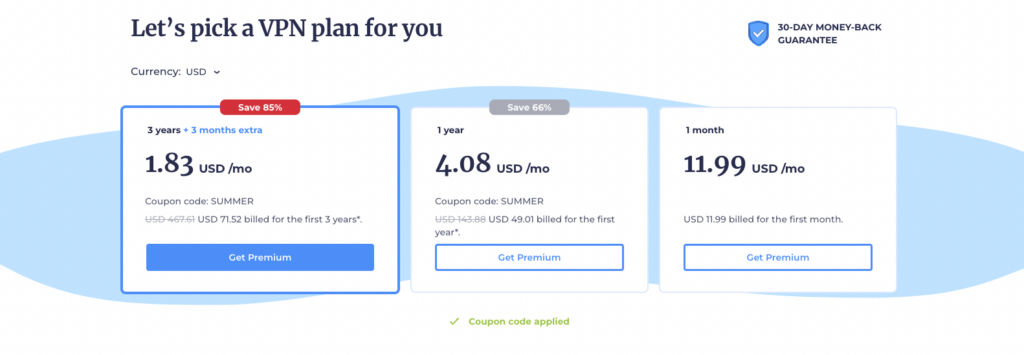Atlas VPN and Surfshark VPN are two significant players in the VPN industry. Atlas VPN, known for its robust free version and comprehensive premium plans, promises high-speed connections and top-notch security. Surfshark, on the other hand, is celebrated for its plethora of features, extensive server network, and competitive pricing.
This comparison will cover key aspects that are critical when choosing a VPN. This includes security and encryption, a no-log policy and jurisdiction, server network, streaming and torrenting capabilities, compatibility and ease of use, pricing, and customer support.
| Features | Atlas VPN | Surfshark VPN | Better VPN |
|---|---|---|---|
| Security and Encryption | Strong | Strong | Tie |
| No-log Policy & Jurisdiction | USA (Five Eyes), Anonymous Account, Strong No-log Policy | British Virgin Islands (outside 14 Eyes), Strong No-log Policy | Surfshark |
| Server Network | ~700 servers in 30 countries | 3200+ servers in 65+ countries | Surfshark |
| Streaming | Partial support (might need server hopping) | Excellent (consistently unblocks major platforms) | Surfshark |
| Torrenting | Allowed on all servers, No P2P specific features | Allowed on all servers, P2P-optimized servers, Risky connections blocklist | Surfshark |
| Compatibility and Ease of Use | Apps for major platforms, No Smart TVs and game console support, Unlimited simultaneous connections | Apps for major platforms including Smart TVs and game consoles, Unlimited simultaneous connections | Surfshark |
| Pricing | Flat rate of ~$9.99 per month | Tiered pricing, best at $2.49 per month for 24-month plan | Depends on use-case (Atlas VPN for short-term, Surfshark for long-term) |
| Customer Support | Email Support, FAQ, Guides, No Live Chat | Email Support, FAQ, Guides, 24/7 Live Chat | Surfshark |
Security and Encryption
Security and encryption form the backbone of any VPN service. VPNs use encryption to scramble your data, making it unreadable to anyone who might intercept it. This is particularly important when using unsecured public Wi-Fi networks, where your data can be vulnerable to cyber threats.
Comparison of the Security Features and Encryption Methods of Atlas VPN and Surfshark VPN
| Security and Encryption Feature | Atlas VPN | Surfshark VPN |
|---|---|---|
| Encryption method | AES-256 | AES-256 |
| Protocols | IKEv2, WireGuard | OpenVPN, IKEv2, WireGuard, Shadowsocks |
| Kill Switch | Yes | Yes |
| DNS Leak Protection | Yes | Yes |
| Double VPN | No | Yes (MultiHop) |
Atlas VPN utilizes strong AES-256 encryption – the same level of encryption used by governments and military worldwide. It offers two protocols: IKEv2 for optimal performance, and WireGuard for a balance of speed and security. They also provide a kill switch feature and DNS leak protection.
Surfshark VPN, meanwhile, matches Atlas VPN with AES-256 encryption but offers a broader selection of protocols: OpenVPN, IKEv2, WireGuard, and Shadowsocks. The inclusion of OpenVPN, a well-respected protocol known for its security and reliability, and Shadowsocks, which is particularly effective at circumventing internet censorship, gives Surfshark a slight edge. Surfshark also offers a kill switch, DNS leak protection, and the addition of a Double VPN feature (called MultiHop), which routes your connection through two servers for an extra layer of privacy.
Pros and Cons for Each VPN in Terms of Security and Encryption
Atlas VPN
Pros:
- Utilizes military-grade AES-256 encryption
- Includes a kill switch and DNS leak protection
Cons:
- Lacks a Double VPN feature
- Fewer protocol options
Surfshark VPN
Pros:
- Offers military-grade AES-256 encryption
- Provides a broader range of protocols, including OpenVPN and Shadowsocks
- Includes a kill switch, DNS leak protection, and a Double VPN feature
Cons:
- No evident cons in terms of security and encryption
When it comes to security and encryption, Surfshark VPN appears to be the stronger choice. While both VPNs offer robust security measures, Surfshark takes it a notch higher with a broader selection of protocols and the addition of a Double VPN feature.
No-log Policy & Jurisdiction
A VPN’s no-log policy and jurisdiction play a critical role in user privacy. A no-log or zero-log policy means that the VPN provider does not keep any records of your online activities. However, the extent of data that a VPN doesn’t record can vary, so it’s essential to read the policy carefully.
Jurisdiction refers to the country where the VPN provider is registered. This matters because local laws and international agreements can influence the level of privacy you have. For example, countries within the 14 Eyes intelligence-sharing network could potentially share your data with one another.
Comparison of Atlas VPN and Surfshark VPN’s No-log Policies and Their Jurisdictions
| No-log Policy & Jurisdiction | Atlas VPN | Surfshark VPN |
|---|---|---|
| Headquarters | Delaware, USA | British Virgin Islands |
| Part of 14 Eyes Alliance | Yes | No |
| No-log Policy | Zero-logs | Zero-logs |
Atlas VPN is based in Delaware, USA, which is part of the 5/9/14 Eyes Alliance. While they have a strict no-log policy, their location could potentially make them susceptible to data requests from intelligence agencies.
Surfshark, on the other hand, is based in the British Virgin Islands, a location outside the 14 Eyes Alliance’s jurisdiction. Coupled with a strict no-logs policy, this offers users a higher level of privacy protection.
Pros and Cons for Each VPN Based on Their No-log Policy and Jurisdiction
Atlas VPN:
Pros:
- Enforces a strict no-log policy
Cons:
- Located in the USA, which is part of the 5/9/14 Eyes Alliance
Surfshark VPN:
Pros:
- Maintains a strict no-log policy
- Based outside of the 14 Eyes Alliance
Cons:
- No evident cons based on their no-log policy and jurisdiction
Considering both the no-log policy and jurisdiction, Surfshark VPN takes the lead. Its location in the British Virgin Islands, outside the 14 Eyes Alliance, coupled with a strict no-log policy, offers a higher level of privacy.
Server Network
The size and distribution of a VPN’s server network can significantly impact its performance and the quality of your online experience. A large, widespread server network can offer better connection speeds and reliability, more location choices, and a greater ability to bypass geo-restrictions.
Comparison of the Server Networks of Atlas VPN and Surfshark VPN
| Server Network | Atlas VPN | Surfshark VPN |
|---|---|---|
| Number of Servers | 700+ | 3200+ |
| Number of Countries | 37 | 100+ |
Atlas VPN has over 700 servers across 37 countries, providing a decent range of locations to choose from. They focus on having multiple servers in strategic locations, ensuring good coverage and connection speeds.
On the other hand, Surfshark boasts over 3200 servers in more than 100 countries. This extensive network ensures fast and reliable connections, a wide choice of virtual locations, and excellent capabilities to bypass geo-restrictions.
Pros and Cons for Each VPN Based on Server Network
Atlas VPN:
Pros:
- Good coverage and connection speeds with servers in strategic locations
Cons:
- Fewer servers and countries compared to Surfshark
Surfshark VPN:
Pros:
- Extensive server network offering more location choices
- Provides reliable connections and excellent ability to bypass geo-restrictions
Cons:
- No evident cons based on server network
In terms of server network size and distribution, Surfshark VPN clearly stands out. Its extensive network provides more location choices, potentially better connection speeds, and an enhanced ability to bypass geo-restrictions.
Streaming
Many streaming services restrict their content based on geographical location due to licensing issues. A VPN allows users to bypass these restrictions by masking their actual IP address and providing a new one from the desired country. This makes the VPN’s streaming performance and its ability to bypass geo-blocks crucial features to consider.
Comparison of the Streaming Capabilities of Atlas VPN and Surfshark VPN
| Streaming Capability | Atlas VPN | Surfshark VPN |
|---|---|---|
| Unblocks Netflix | Yes | Yes |
| Unblocks Amazon Prime Video | Yes | Yes |
| Unblocks Disney+ | Yes | Yes |
| Unblocks BBC iPlayer | Yes | Yes |
| Unblocks Hulu | Yes | Yes |
Both Atlas VPN and Surfshark VPN can unblock major streaming platforms like Netflix, Amazon Prime Video, Disney+, BBC iPlayer, and Hulu. However, their performance varies.
Atlas VPN is competent at unblocking major platforms, but you might encounter some issues and need to switch servers occasionally.
Surfshark VPN, on the other hand, consistently unblocks major platforms, providing a smooth and uninterrupted streaming experience.
Pros and Cons for Each VPN in Terms of Streaming Capabilities
Atlas VPN
Pros:
- Can unblock major streaming platforms
Cons:
- Might require server switching to maintain access
Surfshark VPN
Pros:
- Consistently unblocks major platforms, offering smooth streaming experience
Cons:
- No evident cons in terms of streaming capabilities
Surfshark VPN provides a superior streaming experience due to its ability to consistently unblock major platforms without requiring server switches.
Torrenting
VPNs play a crucial role in safe and anonymous torrenting. They mask your IP address, making it difficult for anyone to trace your online activities back to you. Therefore, the torrenting capabilities of a VPN and its ability to ensure user privacy while torrenting are significant considerations.
Comparison of the Torrenting Capabilities of Atlas VPN and Surfshark VPN
| Torrenting Capability | Atlas VPN | Surfshark VPN |
|---|---|---|
| P2P Support on All Servers | Yes | Yes |
| Kill Switch | Yes | Yes |
| Split Tunneling | No | Yes |
| Blocklist for Risky Connections | No | Yes |
Both Atlas VPN and Surfshark VPN allow torrenting on all servers and provide a kill switch feature that disconnects you from the internet if the VPN connection drops, protecting your privacy.
Surfshark VPN, however, goes the extra mile with split-tunneling, which lets you choose which apps go through the VPN and which don’t. Plus, it has a feature that automatically blocks risky connections, providing an added layer of protection.
Pros and Cons for Each VPN in Terms of Torrenting Capabilities
Atlas VPN
Pros:
- Supports torrenting on all servers
- Provides a kill switch for added security
Cons:
- Lacks advanced features like split-tunneling and a blocklist for risky connections
Surfshark VPN
Pros:
- Supports torrenting on all servers
- Provides a kill switch, split-tunneling, and a blocklist for risky connections
Cons:
- No evident cons in terms of torrenting capabilities
Given its superior features tailored towards torrenting, Surfshark VPN provides a more robust and safer torrenting experience compared to Atlas VPN.
Compatibility and Ease of Use
The best VPNs should not only offer high-quality service but should also be compatible with a wide range of devices and operating systems. Moreover, a user-friendly interface is essential as it ensures a smooth and hassle-free user experience.
Comparison of the Compatibility and Ease of Use of Atlas VPN and Surfshark VPN
| Compatibility and Ease of Use | Atlas VPN | Surfshark VPN |
|---|---|---|
| Supported Platforms | Windows, MacOS, iOS, Android | Windows, MacOS, Linux, iOS, Android, Smart TVs, Game Consoles |
| Simultaneous Connections | Unlimited | Unlimited |
| User Interface | Intuitive | Intuitive |
Atlas VPN offers applications for major platforms: Windows, MacOS, iOS, and Android. They provide unlimited simultaneous connections, meaning you can secure multiple devices at the same time. Their interface is intuitive and straightforward, making it easy for users to navigate and connect to the VPN.
Surfshark VPN takes device compatibility a step further by supporting not only Windows, MacOS, iOS, and Android but also Linux, Smart TVs, and game consoles. Like Atlas VPN, Surfshark also offers unlimited simultaneous connections and has an easy-to-use interface.
Pros and Cons for Each VPN Based on Compatibility and Ease of Use
Atlas VPN
Pros:
- Apps for major platforms and unlimited simultaneous connections
- User-friendly interface
Cons:
- No support for Smart TVs and game consoles
Surfshark VPN
Pros:
- Wide compatibility, including Smart TVs and game consoles
- Unlimited simultaneous connections
- User-friendly interface
Cons:
- No evident cons based on compatibility and ease of use
D. Conclusion on Which VPN is More Compatible and Easier to Use
When considering compatibility and ease of use, Surfshark VPN is the clear winner due to its extensive platform support, including Smart TVs and game consoles, and its user-friendly interface.
Pricing
Pricing is a critical aspect when choosing a VPN service. While affordability is important, it shouldn’t come at the expense of quality. A balance between cost and feature offerings should guide the choice of VPN services.
Comparison of the Pricing Plans of Atlas VPN and Surfshark VPN
| Pricing | Atlas VPN | Surfshark VPN |
|---|---|---|
| Monthly Plan | $11.99 | $12.95 |
| Yearly Plan | $4.08 per month (billed annually) | $6.49 per month (billed annually) |
| 2-Year Plan | N/A | $2.49 per month (billed every two years) |
| Free Trial | Yes | Yes |
| Money-Back Guarantee | 30 days | 30 days |
Atlas VPN offers a monthly plan at $9.99 and a yearly plan at $2.49 per month (billed annually). They also offer a free trial and a 30-day money-back guarantee.

Surfshark VPN’s pricing is slightly more complex. The monthly plan is at $12.95, but they offer a discounted yearly plan at $6.49 per month (billed annually) and a 2-year plan at $2.49 per month (billed every two years). Surfshark also provides a free trial and a 30-day money-back guarantee.
Pros and Cons for Each VPN Based on Pricing
Atlas VPN
Pros:
- More affordable monthly plan
- Free trial and 30-day money-back guarantee
Cons:
- No long-term plan for bigger savings
Surfshark VPN
Pros:
- Offers a 2-year plan for the biggest savings
- Free trial and 30-day money-back guarantee
Cons:
- Higher monthly and yearly plan costs compared to Atlas VPN
In terms of pricing, it largely depends on the user’s needs. For short-term use, Atlas VPN’s monthly plan is more affordable. But for long-term use, Surfshark’s 2-year plan offers significant savings.
Customer Support
Reliable customer support is a critical feature for any VPN service. Issues can arise at any time, and users need assurance that they can get help quickly. Top-notch VPN services typically offer multiple avenues for support, including live chat, email support, and comprehensive knowledge bases.
Comparison of the Customer Support offered by Atlas VPN and Surfshark VPN
| Customer Support | Atlas VPN | Surfshark VPN |
|---|---|---|
| Live Chat | No | Yes |
| Email Support | Yes | Yes |
| FAQ & Guides | Yes | Yes |
| Response Time | Slow | Fast |
Atlas VPN offers email support and has an extensive FAQ and guides section on their website. However, they lack a live chat option, and the response time can be a bit slow.
In contrast, Surfshark VPN has a more comprehensive customer support system. They offer live chat, email support, and also have a thorough FAQ and guides section. Surfshark’s response time is typically faster, making it a more reliable choice for instant assistance.
Pros and Cons for Each VPN in Terms of Customer Support
Atlas VPN
Pros:
- Offers email support and comprehensive FAQ and guides
Cons:
- No live chat option
- Slower response times
Surfshark VPN
Pros:
- Provides live chat and email support, along with extensive FAQ and guides
- Faster response times
Cons:
- No evident cons in terms of customer support
Surfshark VPN outperforms Atlas VPN in customer support, offering a live chat option and faster response times. This makes Surfshark a more reliable choice for immediate assistance.
Conclusion
Throughout this comprehensive comparison of Atlas VPN and Surfshark VPN, we’ve examined multiple factors: security and encryption, a no-log policy and jurisdiction, server network, streaming and torrenting capabilities, compatibility and ease of use, pricing, and customer support.
In most aspects analyzed, Surfshark VPN outperforms Atlas VPN. From a wider server network, more streaming and torrenting capabilities, and better compatibility to superior customer support, Surfshark appears to offer better services overall. However, for short-term users or those seeking a more budget-friendly monthly plan, Atlas VPN might still be a viable option.
In making your decision between Atlas VPN and Surfshark VPN, you should carefully consider what’s most important to you. Are you prioritizing budget, streaming capabilities, and customer support, or perhaps you need broad device compatibility? Your personal use-case scenario will significantly impact which VPN service is best for you but between Atlas VPN and Surfshark VPN I would go with Surfshark VPN.
FAQ
The main differences between Atlas VPN and Surfshark VPN lie in the areas of server network, compatibility, streaming capabilities, and customer support. Surfshark has a larger server network, better device compatibility, superior streaming capabilities, and offers a live chat option for customer support.
Yes, both VPNs can bypass geo-restrictions. However, Surfshark is generally more reliable and consistently unblocks major platforms, including Netflix, Hulu, BBC iPlayer, and more.
Both Atlas VPN and Surfshark VPN have a strict no-log policy, which means they do not track or store your online activities. However, Surfshark operates under the jurisdiction of the British Virgin Islands, which is outside of the 14 Eyes alliance, making it a more privacy-friendly option.
While both VPNs allow torrenting on their servers, Surfshark is the better option as it offers P2P-optimized servers and features a risky connections blocklist for added security.
It largely depends on the user’s needs. For short-term use, Atlas VPN’s monthly plan is more affordable. But for long-term use, Surfshark’s 2-year plan offers significant savings.
Surfshark VPN outshines Atlas VPN in terms of customer support, offering a 24/7 live chat option and faster response times.

